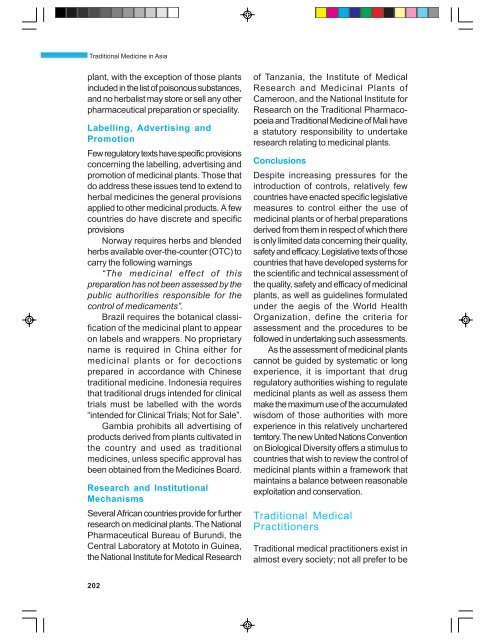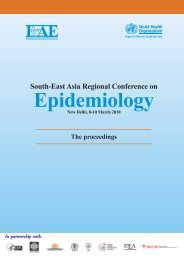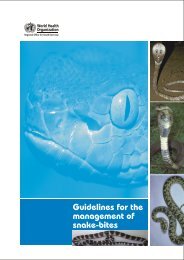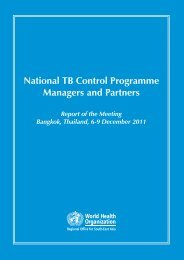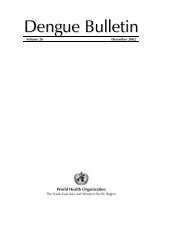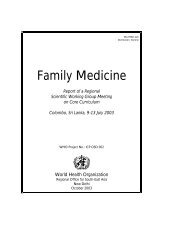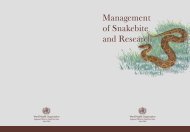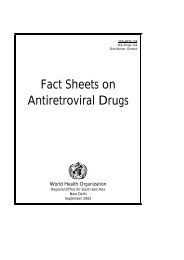Traditional Medicine in Asia
Traditional Medicine in Asia
Traditional Medicine in Asia
Create successful ePaper yourself
Turn your PDF publications into a flip-book with our unique Google optimized e-Paper software.
<strong>Traditional</strong> <strong>Medic<strong>in</strong>e</strong> <strong>in</strong> <strong>Asia</strong><br />
plant, with the exception of those plants<br />
<strong>in</strong>cluded <strong>in</strong> the list of poisonous substances,<br />
and no herbalist may store or sell any other<br />
pharmaceutical preparation or speciality.<br />
Labell<strong>in</strong>g, Advertis<strong>in</strong>g and<br />
Promotion<br />
Few regulatory texts have specific provisions<br />
concern<strong>in</strong>g the labell<strong>in</strong>g, advertis<strong>in</strong>g and<br />
promotion of medic<strong>in</strong>al plants. Those that<br />
do address these issues tend to extend to<br />
herbal medic<strong>in</strong>es the general provisions<br />
applied to other medic<strong>in</strong>al products. A few<br />
countries do have discrete and specific<br />
provisions<br />
Norway requires herbs and blended<br />
herbs available over-the-counter (OTC) to<br />
carry the follow<strong>in</strong>g warn<strong>in</strong>gs<br />
“The medic<strong>in</strong>al effect of this<br />
preparation has not been assessed by the<br />
public authorities responsible for the<br />
control of medicaments”.<br />
Brazil requires the botanical classification<br />
of the medic<strong>in</strong>al plant to appear<br />
on labels and wrappers. No proprietary<br />
name is required <strong>in</strong> Ch<strong>in</strong>a either for<br />
medic<strong>in</strong>al plants or for decoctions<br />
prepared <strong>in</strong> accordance with Ch<strong>in</strong>ese<br />
traditional medic<strong>in</strong>e. Indonesia requires<br />
that traditional drugs <strong>in</strong>tended for cl<strong>in</strong>ical<br />
trials must be labelled with the words<br />
“<strong>in</strong>tended for Cl<strong>in</strong>ical Trials; Not for Sale”.<br />
Gambia prohibits all advertis<strong>in</strong>g of<br />
products derived from plants cultivated <strong>in</strong><br />
the country and used as traditional<br />
medic<strong>in</strong>es, unless specific approval has<br />
been obta<strong>in</strong>ed from the <strong>Medic<strong>in</strong>e</strong>s Board.<br />
Research and Institutional<br />
Mechanisms<br />
Several African countries provide for further<br />
research on medic<strong>in</strong>al plants. The National<br />
Pharmaceutical Bureau of Burundi, the<br />
Central Laboratory at Mototo <strong>in</strong> Gu<strong>in</strong>ea,<br />
the National Institute for Medical Research<br />
202<br />
of Tanzania, the Institute of Medical<br />
Research and Medic<strong>in</strong>al Plants of<br />
Cameroon, and the National Institute for<br />
Research on the <strong>Traditional</strong> Pharmacopoeia<br />
and <strong>Traditional</strong> <strong>Medic<strong>in</strong>e</strong> of Mali have<br />
a statutory responsibility to undertake<br />
research relat<strong>in</strong>g to medic<strong>in</strong>al plants.<br />
Conclusions<br />
Despite <strong>in</strong>creas<strong>in</strong>g pressures for the<br />
<strong>in</strong>troduction of controls, relatively few<br />
countries have enacted specific legislative<br />
measures to control either the use of<br />
medic<strong>in</strong>al plants or of herbal preparations<br />
derived from them <strong>in</strong> respect of which there<br />
is only limited data concern<strong>in</strong>g their quality,<br />
safety and efficacy. Legislative texts of those<br />
countries that have developed systems for<br />
the scientific and technical assessment of<br />
the quality, safety and efficacy of medic<strong>in</strong>al<br />
plants, as well as guidel<strong>in</strong>es formulated<br />
under the aegis of the World Health<br />
Organization, def<strong>in</strong>e the criteria for<br />
assessment and the procedures to be<br />
followed <strong>in</strong> undertak<strong>in</strong>g such assessments.<br />
As the assessment of medic<strong>in</strong>al plants<br />
cannot be guided by systematic or long<br />
experience, it is important that drug<br />
regulatory authorities wish<strong>in</strong>g to regulate<br />
medic<strong>in</strong>al plants as well as assess them<br />
make the maximum use of the accumulated<br />
wisdom of those authorities with more<br />
experience <strong>in</strong> this relatively unchartered<br />
territory. The new United Nations Convention<br />
on Biological Diversity offers a stimulus to<br />
countries that wish to review the control of<br />
medic<strong>in</strong>al plants with<strong>in</strong> a framework that<br />
ma<strong>in</strong>ta<strong>in</strong>s a balance between reasonable<br />
exploitation and conservation.<br />
<strong>Traditional</strong> Medical<br />
Practitioners<br />
<strong>Traditional</strong> medical practitioners exist <strong>in</strong><br />
almost every society; not all prefer to be


